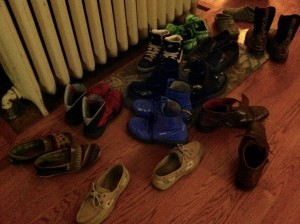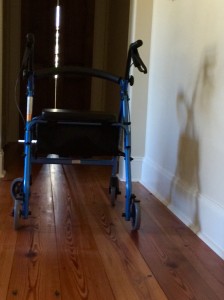Even before our waiter asks how he should split the bill, I can feel him eyeing us with each visit to our table—trying to suss out our relationships to one another. Our teenage girls had arrived at the restaurant with me and my husband; the four of us were seated at our table for seven about five or ten minutes before the girls’ dad, stepmom, and preschool-aged half brother joined us.
After our plates are cleared, my eldest daughter, whose birthday we’re celebrating, rests her head on her dad’s shoulder as I take a few photos of them, and my husband entertains the little guy, who is blonde like his big half-sisters. I lean toward my girls’ stepmom, who is sitting on my left, to show her the sweetest of the photos I’ve just taken. We “Awww…” together at the expression on the face of this girl we both mother.
“How would you like the check?” our server asks, his eyes darting around, not sure who exactly to address.
I look at my ex-husband and hesitate—we’ve been known to not gravitate toward the same answers to life’s questions.
“Should we each pay for one of the girls or just split it down the middle?”
“Down the middle seems easiest,” he replies.
When you’re co-parenting and blending families, easiest—when it’s available—is always the right choice.
* * * * *
The real mess of divorce starts long before the divorce. Emotions become frayed and tangled, territories that used to be shared are sloppily divided and staked, and any path forward that once seemed clear becomes so overgrown with weeds and briars it can hardly be called a path.
Even before the decision is made that one of you has to go, the emotional seed of the mess begins sending out physical roots that can trip you up. But it’s when you actually begin dividing household items—pulling all the cooking utensils out of drawers and spreading them on the counter, attempting to make sure each person has a fairly complete set of tools to see them through the cooking of a meal—that the mess becomes tangible. It can’t be ignored.
There it is, all laid out there on the table before you—every drawer and cupboard emptied, each item evaluated, falling somewhere on the broad spectrum of worth: meaningful, useful, expensive, replaceable, and I-didn’t-even-remember-we-had-that. The process is repeated again and again, room by room. Now every book and CD you jointly own is spread across the living room rug. Then the artwork takes its turn and is divvied up.
Even after he has packed up and moved his share to an apartment he is renting, even after my things have been put away, I’m still faced with all of the things he didn’t bother taking but I don’t want, either.
What I do want is a Dumpster in the driveway. What could feel more decisive and freeing than filling a receptacle big enough to contain all your junk—literal and figurative? Because I realize part of my longing for a Dumpster stems from a desire to clear my life of certain memories and regrets, along with the boxes of odd books and knick-knacks my husband had a habit of picking up at garage sales, thinking they might one day be useful for something.
* * * * *
A decade later, I know there’s more to a mess than what meets the eye.
 The pile of shoes perpetually cluttering our front entryway tells of a home where people feel welcomed and comfortable, of teenagers and their friends coming and going, of volleyball games and dog-walking in the rain.
The pile of shoes perpetually cluttering our front entryway tells of a home where people feel welcomed and comfortable, of teenagers and their friends coming and going, of volleyball games and dog-walking in the rain.
Clothes all over the bed represent progress—they’re no longer stinky and stained, stuffed in the hamper, they’re clean and fresh, waiting to be folded. Soon enough they will make it to their rightful places in drawers and on hangers, and our bed will be ready to receive us at the end of a long day.
The more cluttered the garage gets with bags of leaves, the cleaner the yard is. It feels like a trade-off in the moment, but each time I navigate around the bags on my way through the garage, they speak of muscle-work done in fresh air, and multiple sets of hands making progress before the sun goes down.
And inside our front door, not far from the perpetual pile of shoes, hangs a painting my ex-husband made of our first house. It still has a place in my home today—not because he painted it or because it was our house, but because he is my daughters’ dad, and it was their first house. The painting hangs where it can help us acknowledge and honor a piece of our past.
Sometimes, I’ve learned, we get to decide what will be messy and what won’t—even without the help of a Dumpster.



















